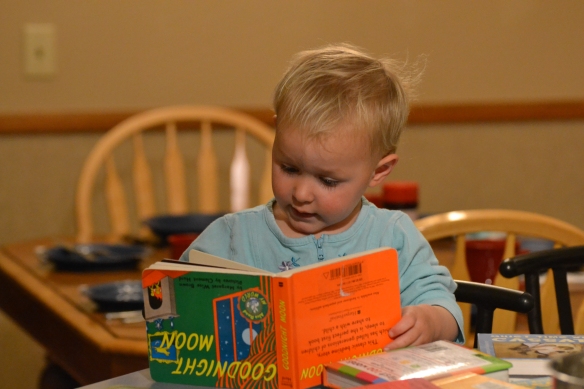
It is a good rule, after reading a new book, never to allow yourself another new one till you have read an old one in between. If that is too much for you, you should at least read one old one to every three new ones. — C.S. Lewis
The rewards of deep reading (reading several books on the same subject or by the same author) are plentiful: synthesis, comprehension, analysis. Or just the possibility of remembering the main point. Reading widely pays well, too. The stab of joy, the searing beauty of synchronicity! When I read Book G and it revisits something I read in Book B with no obvious connection between the two? Oh, man. It gets my voice in the high treble range and sets my fingers aflutter.
I thought it would be fun to classify my reading list for 2015 chronologically by publication date. I like old books, yes. But I also have been guilty of reverse-snobbery, where I lift my nose a few centimeters and declare that I’m not all that interested in modern writing. Blech! (autocorrect wanted to change that to belch; that works, too!) As you can see, I’ve overcome that weakness, haha!
2011-2015 (30 books)
Reclaiming Conversation Sherry Turkle
Come Rain or Come Shine Jan Karon
Bread and Wine Shauna Niequist
Earthen Vessels Matthew Lee Anderson
Being Mortal Atul Gawande
Fierce Convictions Karen Swallow Prior
As Chimney Sweepers Come to Dust Alan Bradley
Landfalls Naomi Williams
The Wright Brothers David McCullough
All the Light We Cannot See Anthony Doerr
Gutenberg’s Apprentice Alix Christie
Nigellissima Nigella Lawson
Among the Janeites Deborah Yaffe
Wheat Belly William Davis
Every Good Endeavor Timothy Keller
Coolidge Amity Shlaes
The Book of Strange New Things Michel Faber
The Green Ember S.D. Smith
Food: A Love Story Jim Gaffigan
Dad Is Fat Jim Gaffigan
God Made All of Me Justin Holcomb
No Higher Honour Condoleezza Rice
The Forgotten Founding Father Joshua Kendall
Delancey Molly Wizenberg
Lit! The Christian Guide to Reading Books Tony Reinke
The Curious Case of the Copper Corpse Alan Bradley
The Every-Other-Day-Diet Krista Varady
Tsura Heather Anastasiu
House of Stone Heather Anastasiu
One Good Dish David Tanis
Naturally, since I myself am a writer, I do not wish the ordinary reader to read no modern books. — C.S. Lewis
2000-2010 (24 books)
In the Midst of Life Jennifer Worth
The Midwife Jennifer Worth
Waiting for Snow in Havana Carlos Eire
The River of Doubt Candice Millard
Mudhouse Sabbath Lauren Winner
Complications Atul Gawande
Unless It Moves the Human Heart Roger Rosenblatt
The Importance of Being Seven Alexander McCall Smith
The Best Day, The Worst Day Donald Hall
A Personal Odyssey Thomas Sowell
The Shoebox Bible Alan Bradley
Sonata for Miriam Linda Olsson
Better: A Surgeon’s Notes on Performance Atul Gawande
Shadows of the Workhouse Jennifer Worth
Inkheart Cornelia Funke
The Unbearable Lightness of Scones Alexander McCall Smith
Old Filth Jane Gardam
The Man in the Wooden Hat Jane Gardam
How to Read Shakespeare Nicholas Royle
In Thy Dark Streets Shineth David McCullough
The House at Riverton Kate Morton
Not Quite What I Was Planning: Six Word Memoirs Larry Smith
Widow of the South Robert Hicks
A Separate Country Robert Hicks
1990-1999 (7 books)
A Pianist’s Landscape Carol Montparker
Down the Common Ann Baer
Poems New and Collected Wistawa Szymborska
Melodious Accord Alice Parker
One Year Off David Elliot Cohen
Girl in Hyacinth Blue Susan Vreeland
Jeremy: The Tale of An Honest Bunny Jan Karon
1980-1988 (2 books)
Godric Frederick Buechner
To School Through the Fields Alice Taylor
1970-1979 (1 book)
The Brendan Voyage Tim Severin
1950-1969 (4 books)
A Grief Observed C.S. Lewis
How Does a Poem Mean? John Ciardi
On the Beach Nevil Shute
The Schoolmasters Leonard Everett Fisher
1900-1949 (7 books)
Orthodoxy G.K. Chesterton
The Adventures of Sally P.G. Wodehouse
Pied Piper Nevil Shute
Anna and the King of Siam Margaret Landon
I Capture the Castle Dodie Smith
Mont-Saint-Michel and Chartres Henry Adams
Jimmy at Gettysburg Margaret Bigham Beitler
The only palliative is to keep the clean sea breeze of the centuries blowing through our minds, and this can be done only by reading old books. — C.S. Lewis
1800-1899 (4 books)
Doctor Wortle’s School Anthony Trollope
Sir Henry Hotspur Anthony Trollope
Henry Heathcote of Gangoil Anthony Trollope
Luck of the Roaring Camp Bret Harte
1500-1599 (2 books)
Henry IV, Part I William Shakespeare
Henry IV, Part 2 William Shakespeare
0- 500 AD (2 books)
On the Incarnation Athanasius
Marcus Aurelius and his Times Marcus Aurelius
Photograph is my granddaughter, reading Goodnight Moon to me.




 my disheveled, dis-shelved nightstand
my disheveled, dis-shelved nightstand

























